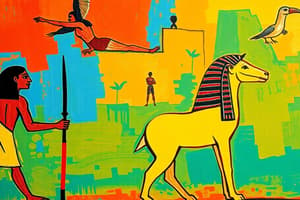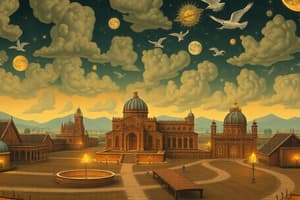Podcast
Questions and Answers
What was a significant impact of the Crusades on European societies?
What was a significant impact of the Crusades on European societies?
- Increased isolation from other cultures
- Complete rejection of religious beliefs
- Stimulated trade and cultural exchange (correct)
- Strengthened feudal bonds between lords and vassals
Which period is characterized by the rise of universities and scholastic thought?
Which period is characterized by the rise of universities and scholastic thought?
- Scientific Revolution
- Medieval Period (correct)
- Renaissance
- Enlightenment
What was a key development that occurred during the Renaissance?
What was a key development that occurred during the Renaissance?
- Decline in trade and exploration
- Invention of the printing press (correct)
- Abandonment of classical learning
- Decentralization of knowledge
What characterized the Scientific Revolution?
What characterized the Scientific Revolution?
What is one outcome of global interconnections throughout history?
What is one outcome of global interconnections throughout history?
What was a significant outcome of the shift from nomadic lifestyles to settled agricultural communities?
What was a significant outcome of the shift from nomadic lifestyles to settled agricultural communities?
Which early civilization is known for developing a centralized state under a powerful leader?
Which early civilization is known for developing a centralized state under a powerful leader?
What type of writing system did Mesopotamian societies develop?
What type of writing system did Mesopotamian societies develop?
Which of the following was a significant aspect of Greek civilization?
Which of the following was a significant aspect of Greek civilization?
What was one major contribution of the Roman Empire in terms of societal development?
What was one major contribution of the Roman Empire in terms of societal development?
What kind of urban planning was characteristic of the ancient civilizations in the Indus Valley?
What kind of urban planning was characteristic of the ancient civilizations in the Indus Valley?
What significant change followed the collapse of the Roman Empire?
What significant change followed the collapse of the Roman Empire?
How did the emergence of Islam influence the world after the classical civilizations?
How did the emergence of Islam influence the world after the classical civilizations?
Flashcards
Medieval Feudalism
Medieval Feudalism
A hierarchical system in Europe where lords granted land to vassals in exchange for loyalty and military service.
Renaissance
Renaissance
A period in Europe marked by a renewed interest in classical learning and arts.
Islamic Advancements
Islamic Advancements
The Islamic civilization made significant strides in fields like math, astronomy, and medicine during a certain period.
Cultural Exchange
Cultural Exchange
Signup and view all the flashcards
Printing Press
Printing Press
Signup and view all the flashcards
Agricultural shift
Agricultural shift
Signup and view all the flashcards
River valley civilizations
River valley civilizations
Signup and view all the flashcards
Egyptian civilization
Egyptian civilization
Signup and view all the flashcards
Mesopotamian City-States
Mesopotamian City-States
Signup and view all the flashcards
Greek Democracy
Greek Democracy
Signup and view all the flashcards
Roman Empire
Roman Empire
Signup and view all the flashcards
Collapse of Rome
Collapse of Rome
Signup and view all the flashcards
Rise of Islamic Influence
Rise of Islamic Influence
Signup and view all the flashcards
Study Notes
Early Civilizations
- Early human societies transitioned from nomadic hunter-gatherer lifestyles to settled agricultural communities.
- This shift, driven by advancements in farming techniques, led to population growth and the development of permanent settlements.
- Early civilizations emerged in fertile river valleys, such as the Nile in Egypt, the Tigris and Euphrates in Mesopotamia, and the Indus in the Indian subcontinent, leveraging their proximity to water resources.
- Key features of these early civilizations included the development of writing systems, complex social structures, and monumental architecture.
- The rise of agriculture facilitated the specialization of labor, allowing individuals to focus on specific crafts or professions.
Ancient Civilizations
- Ancient Egypt developed a highly organized, centralized state with a powerful pharaoh at its head.
- The Egyptian civilization was known for advancements in mathematics, astronomy, and medicine, alongside magnificent pyramids and elaborate burial practices.
- Mesopotamia witnessed the emergence of various city-states and empires.
- Mesopotamian societies were innovative in developing cuneiform writing, advanced irrigation systems, and law codes.
- Ancient civilizations in the Indus Valley developed sophisticated urban planning and drainage systems.
- The Greeks established a unique system of governance and philosophy that profoundly influenced Western thought and culture.
- The Roman Empire expanded across vast territories, leaving lasting impacts on European law, language, and architecture.
Classical Civilizations
- Ancient Greece excelled in philosophy, democracy, and the arts.
- Greek thinkers, including Socrates, Plato, and Aristotle, laid the groundwork for Western philosophical thought.
- Societies like the Roman Empire developed complex governance systems influenced by Greek ideas, establishing widespread trade routes.
- The Roman Republic evolved into an empire, expanding its reach and consolidating its power across Europe.
- Roman contributions included a sophisticated legal system and advancements in engineering and infrastructure.
Post-Classical World
- The collapse of the Roman Empire led to the fragmentation of power and the rise of new political entities.
- The emergence of Islam played a significant role in shaping social and cultural landscapes across the Middle East and North Africa.
- Islamic civilization made advancements in various fields, including mathematics, astronomy, and medicine.
- China continued to be a dominant power with advancements in technology and the arts.
- The spread of Buddhism and other religions had a profound impact on societies across East and South Asia.
Medieval Period
- The Medieval Period saw the rise of feudalism in Europe.
- Feudalism involved a hierarchical system of obligations between lords and vassals.
- The Crusades, a series of religious wars, significantly impacted European societies.
- Europe witnessed the rise of universities and the flourishing of scholastic thought.
Renaissance and Modern Era
- The Renaissance in Europe marked a period of renewed interest in classical learning and arts.
- The printing press revolutionized the dissemination of knowledge.
- Exploration and trade led to global connections and cultural exchange.
- The Scientific Revolution fostered significant advancements in science and technology.
- The Enlightenment emphasized reason and individual rights.
- Political revolutions and industrialization marked the shift to the modern period.
- Globalization and technological advancements have characterized the modern era.
Global Interconnections
- Throughout history, diverse civilizations have interacted and influenced one another.
- Interaction across regions led to the exchange of ideas, technologies, and goods.
- Cultural diffusion and trade impacted political, economic, and social structures.
Studying That Suits You
Use AI to generate personalized quizzes and flashcards to suit your learning preferences.




